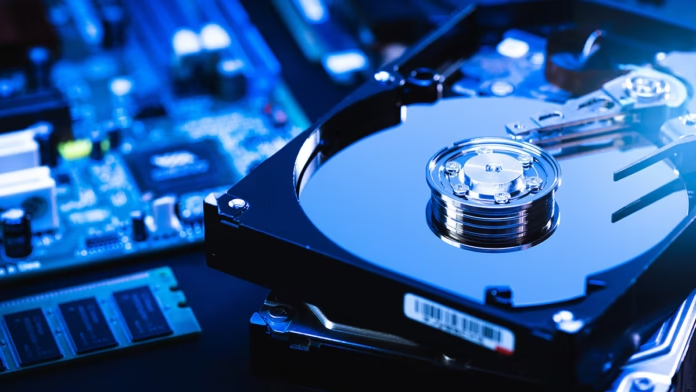Presently, data storage holds great significance in the personal world, as well as profit-making. It ranges from family photos to expansive corporate data collections, keeping all digital securing assets and making them easily available and accessible. But how could this possibly happen? What are the different methods of storing data? Well, let’s find out.
Table of content
- What is Computer Data Storage?
- Types of Computer Data Storage
- Different Types of Storage and Some Benefits with Each
- Choosing a Data Storage Solution that’s right for you:
- Data Security within Storage
- Trends that Are Becoming Mainstay in Data Storage
- Final Thoughts.
- Some FAQs
What is Computer Data Storage?
Computer data storage refers to the devices and technologies devised for the safety of digital information. A computer stores data for immediate access or retrieval at a later time: operating systems, applications, files, and multimedia.
Types of Computer Data Storage
- Primary Storage
The primary storage, which is also referred to as volatile memory, temporarily retains data for quick access by the computer.
RAM (Random Access Memory): Reserved by a CPU for retaining active programs and data.
Cache Memory: A smaller form of RAM that works faster for quick access to data that is frequently used.
- Secondary Storage
Permanent retention of data is offered by secondary storage devices until the user chooses to delete it or overwrites it.
Hard Disk Drives (HDD): They are the conventional mechanisms of magnetic storage with moving parts granting greater capacity storage at a lesser price.
Solid-State Drives (SSD): They are faster and more durable compared to HDD as they store flash memory rather than rotating disks.
- Tertiary Storage
This is a storage that is mainly for archiving and backup purposes.
Optical disks: They comprise CDs, DVDs, and Blu-rays, which are typically utilized for data storage over an extended period.
Tape Drives: Magnetic tapes are commonly known for their use in performing large-scale backups.
Cloud Storage: Cloud storage allows one to keep data online, and which can be accessible from anywhere using the internet. Google Drive, Dropbox, and Amazon S3 are popularly used.
Different Types of Storage and Some Benefits with Each
- Very economical for high capacities.
- Best suited for archival and backup storage.
Solid State Drives:
- Higher speeds of reading and writing.
- Durability in case of physical shocks.
Cloud storage:
- It is scalable and accessible from almost everywhere.
- It also decreases the need for physical storage devices.
Choosing a Data Storage Solution that’s right for you:
You need to know how much space you need. Generally, tinkerers need between a few hundred gigabytes, while businesses routinely throw around terabytes or petabytes as a matter of course.
- Speed
SSD has the speed to load very quickly and smoothly while gaming or using a high-performance application.
- Durability and Longevity
SSDs are more shock-resistant than standard HDDs for mobile devices or environmentally unsafe surroundings.
- Budget Constraints
HDDs serve well in the storage area, building size mostly, whereas SSDs are considerably costlier and outperform them but in performance.
Data Security within Storage
Of course, with all these events, security becomes an even greater concern in terms of securing stored data.
Encryption: Makes stored data unreadable to unauthorized users.
Regular Backups: Protects data from accidental loss.
Access Controls: restrict access to sensitive information.
Trends that Are Becoming Mainstay in Data Storage
- Storage NVMe
Non-Volatile Memory Express provides ultra-fast speeds for transferring data and is therefore the choice for any high-performance computing.
- Artificial Intelligence Storage Management
AI optimizes usage with prediction for effective capacity needs management.
- Hybrid Cloud Solutions
With hybrid architecture, organizations can now blend the on-premise with the cloud, balancing both security and accessibility.
Final Thoughts.
The crux of modern digital infrastructure is associated with storage of data on the computers. Data storage devices are the most essential component. The users possess freedom over storage devices; right from the choosing of an age-old HDD or SDD to today’s most superior cloud solutions. When you follow the trends, specifications, and emerging types of data storage, then it becomes easy to choose and assure that you are protected from losing your priceless data.
Some FAQs
- What is the difference between HDD and SSD?
HDDs are data storage devices that continue to use spinning plates, while SSDs use flash memory as their data storage technology. In this regard, SSD has a certain advantage over HDD in terms of speed, durability, and energy efficiency.
- Is cloud storage secure?
Cloud storage is certainly not as secure as the user’s data; it only relies on the cloud storage provider, which has encryption and other security measures, so the user still has to use a strong password and enable two-factor authentication.
- Can I use both HDD and SSD in one computer?
Yes, absolutely! In most cases, SSDs are installed as storage for the operating system and other files that are frequently accessed, while HDDs take care of all the bulk data storage needs.
- How much storage do I need for gaming?
The recommendation for gaming would be to have at least 1TB for modern titles, which usually require a good amount of space.
- What is NVMe storage?
Non-Volatile Memory Express (NVMe) is a protocol used for solid state drives that promises much faster data transfer as compared to traditional SATA-based solid state drives.



